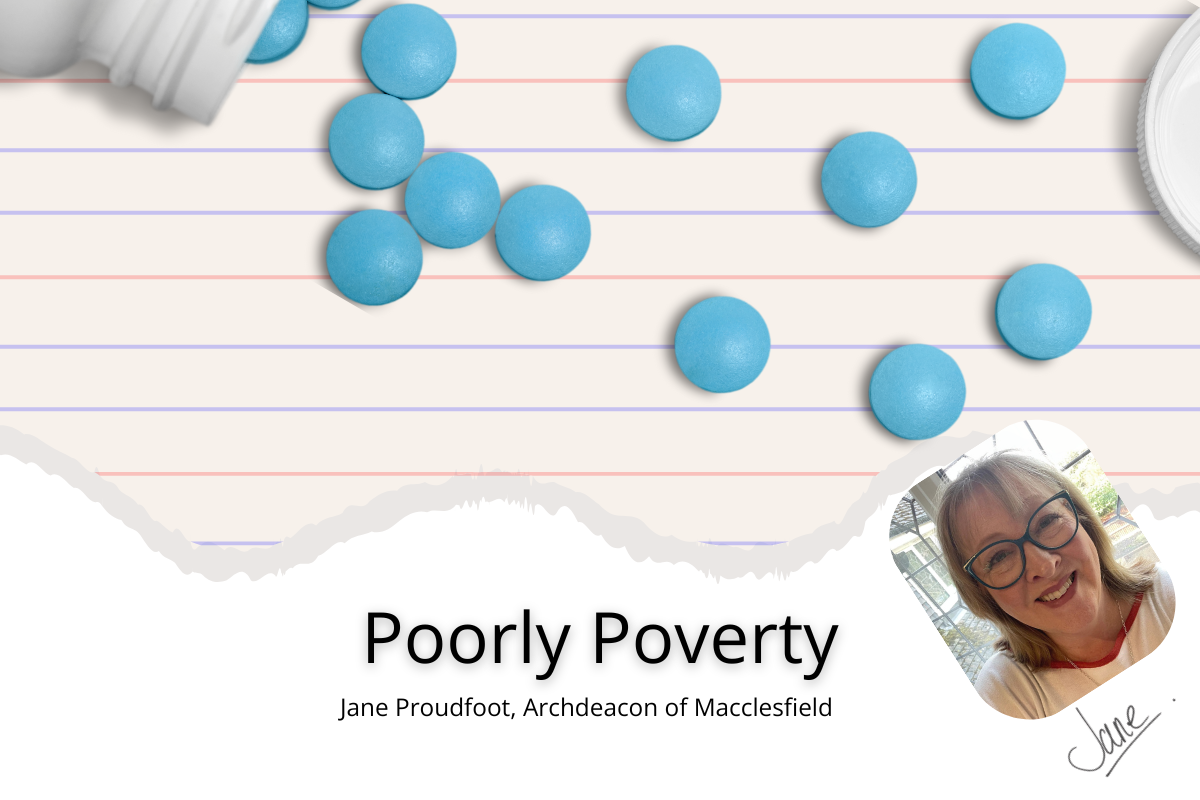
When I was a child, growing up in East Lancashire we didn't talk about people being ill. If we referred to someone being sick, that had a very specific and literal meaning. So unless you were ‘at death’s door’, you were described as ‘being poorly’. There were gradations of course, you were either a bit poorly, very poorly or seriously poorly but this was the word used to indicate ill health.
While I hear the word less frequently these days, it strikes me now that that word is a good one because it equates illness with being poor, a comparison that the other words miss. It used to be common to think about illness in this way. One reason for this is surely because those who are materially poor are more susceptible to disease and infection than those who are well off. The hardships suffered by those living in poverty across the world can never be far from our thoughts. Our response, loving our neighbour, must be both prayerful and practical, our giving generous, and our attitude compassionate.
Yet, there’s something else about ‘being poorly’ that suggests that illness itself reduces us, making us poorer than we were, changing our circumstances in something other than a material way. Life is altered. We can no longer be sure of how to live as we did before. When times are easy and health is good, we get used to being able to rely on ourselves, our bodies, our resources. Being self-sufficient is seen as a laudable goal. Standing on my own two feet, sorting out my own problems, being a burden to no one, owing nothing to any one.
Jesus had an encounter with a rich young man and in answer to his question about how to live eternally, Jesus told him to give away all that he had to the poor. The man couldn’t imagine a life without material wealth, and as a young man maybe couldn’t ever imagine a time when he wouldn’t be fit and well, and he walked away from Jesus, in sorrow. Did Jesus recognise in that man a self-sufficiency that was taking him away from God?
Oscar Romero, whose life’s work was among the poor of El Salvador, observed that poverty highlights our need for reliance. It forces us to admit that we cannot do things on our own, and that living a life of lone-ness, a life of self sufficiency, where we separate our needs from the assistance of those around us, is not the life that God wants us to live. The poor are counted by Jesus as amongst the blessed because of their understanding, born of desperation, of their utter reliance on God.
I’ve found that ‘being poorly’ has made me strip away and re-examine all of the things that I rely on to shore up my self-perception and the self that I present to others. My health, my ability to undertake everyday tasks, my ability to sort things out for myself . When you’re poorly you have to rely on other people to diagnose, to prescribe and treat. You need other people to get things for you, to make food for you, to bring you water, to do your housework and cover your job. You have to give in and give up all of the things that you've convinced yourself makes you self-reliant.
What I've realized in all of that is that that self-reliance is a trap. It's an enticement to turn away from community and turn away from God rather than saying ‘I need you, friends, family, God’. Self reliance says ‘I don't need you. It's nice to have you around occasionally, nice to talk to you, but I don't need you’. To have a need of someone is to admit that you can't do it by yourself, that you need to have people who will pray for you, care for you, love you. It’s also admitting that you need God, that everything that you have depends on him, that without him your life is not worth living, that you do owe him everything.
Were the whole realm of nature mine, that were an offering far too small. Love so amazing, so divine demands my heart, my life, my all.
It’s humbling, but I’ve met so many people for whom this feels shaming. To admit that you can't do it by yourself, to admit your desperate need, letting go of the deception of self-sufficiency. Yet God isn't trying to shame us into submission. God is saying you need community, you need connection, you need communion, you need others and you need me.
That need is about mutuality, reciprocation, humility. It's about giving and it's about receiving. If you have a relationship with God that accepts that ‘Everything, Lord, is yours, comes from you, depends on you’, then it makes it so much easier to receive from others.
When you look at how Jesus gave himself away and how he, with gentleness and kindness, approached those who knew desperation because they were in poor and poorly. When you look at how he, nailed to the cross, knew utter abandonment, and yet forgave his accusers. When you see him bringing together the disciple he loved and his mother, Mary, into familial and reliant relationship. Then you look on a God who understands our need for him and, in our poorly poverty, loves and blesses us.
God bless

The Venerable Jane Proudfoot, Archdeacon of Macclesfield